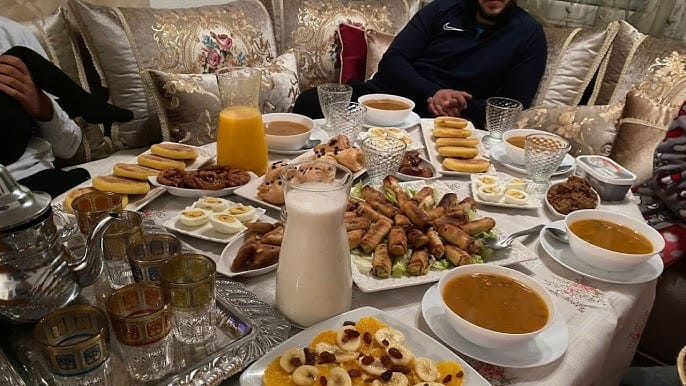Ramadan, the holy month for Muslims, is a period of deep spirituality, fasting and reflection. This annual event is not only an essential pillar of Islam, but also a cultural and communal experience that transforms daily life in many countries, including Morocco.
Knowing what Ramadan is, how it is experienced and when it will take place in the coming years is fundamental to understanding this important celebration.
What is Ramadan?
Ramadan is the ninth month of the Islamic calendar, based on the lunar cycle. During this time, Muslims around the world fast from sunrise to sunset, refraining from eating, drinking, smoking and other activities during daylight hours.
This fast, known as sawm, is one of the Five Pillars of Islam, which represent the fundamental principles of this religion.

The main purpose of Ramadan is to strengthen the bond with Allah through prayer, charity and reflection. It is also a time to practice self-control, patience and gratitude, recognizing the blessings of life.
Duration and Rituals of Ramadan
Ramadan lasts between 29 and 30 days, depending on the observation of the new moon that marks the beginning and end of the month. The fasting days begin with a pre-dawn meal called suhoor and conclude with iftar, the evening meal. It is common to break the fast with dates and water, following the tradition of the Prophet Muhammad.
In addition to fasting, Ramadan is characterized by:
- Night prayers (Tarawih): These are held in mosques and are a key moment for the community.
- Quran reading: Many Muslims strive to complete the reading of the holy book during this month.
- Zakat al-Fitr: An obligatory donation at the end of Ramadan to help the needy.
The month concludes with the holiday of Eid al-Fitr, a day of celebration when families come together, share special meals and perform acts of charity.
Dates of Ramadan in 2025, 2026 and 2027
The Islamic calendar is lunar, so the dates of Ramadan change every year, moving forward approximately 10-12 days compared to the Gregorian calendar. These are the estimated dates for the next few years:
- Ramadan 2025: From February 29 to March 30.
- Ramadan 2026: From February 18 to March 19.
- Ramadan 2027: From February 8 to March 9.
It is important to keep in mind that these dates may vary according to the observation of the moon in different regions.
How Ramadan is experienced in Morocco
In Morocco, Ramadan is a unique cultural experience. During this month, cities come alive in a special way: the streets fill with the aromas of spices and freshly baked bread before iftar, mosques glow with lights during night prayers, and families gather to share traditional dishes such as harira, dates and sfenj (Moroccan doughnuts).
The markets, known as souks, have a vibrant activity, especially in the hours before sunset, when Moroccans buy fresh food to prepare the day’s meals. In the evenings, the cities offer a peaceful and spiritual atmosphere, ideal for strolling through their medinas.
Planning a trip during Ramadan
Traveling to Morocco during Ramadan can be a fascinating experience for those who wish to experience this tradition up close. While some daytime activities may be quieter, evenings take on a special glow with festivities and family gatherings.
An excellent way to explore the cultural and historical richness of Morocco, whether during Ramadan or at any time of the year, is through an organized tour such as the Morocco Imperial Cities Tour 7 days.
This tour allows you to visit emblematic places such as Marrakech, Fez, Rabat and Meknes, and offers an immersion in the cultural diversity of the country. In addition, traveling with a local guide will allow you to better understand the traditions of Ramadan and enjoy authentic experiences, such as tasting an iftar in a historic medina.
Tips for travelers during Ramadan
- Respect local customs: During the day, it is important to avoid eating, drinking or smoking in public.
- Take advantage of the evenings: Many markets and restaurants open after iftar, offering a unique opportunity to enjoy the nightlife.
- Plan activities: Some tourist attractions may have reduced schedules, so it is advisable to organize your itinerary in advance.